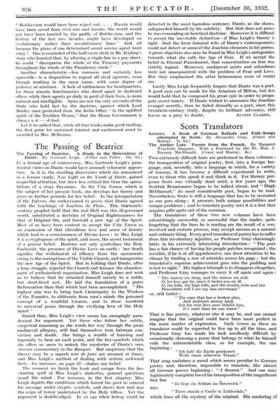The Passing of Beatrice
The Passing of Beatrice. A Study in the Heterodoxy of Dante. By Gertrude Leigh. (Faber and Faber. 10s. 6d.) Ix a formal age of controversy, Miss Gertrude Leigh's para- doxical views on Dante would have aroused vehement opposi- tion. As it is, the startling discoveries which she announced in a former study, New Light on the Youth of Dante, gained respectful attention, but drew less critical fire than the specu- lations of a stray Baconian. In the Vita Nuova, which is the subject of her present book, she develops her theory and gives us further grounds for her belief. In the interpretation of the Inferno, she endeavoured to prove that Dante agreed with the teachings of Joachim de Fiore. This thirteenth- century prophet held that the real Hell was this ill-governed world, substituted a doctrine of Original Righteousness for that of Original Sin, and foretold a new Age of the Spirit. Most of us have been content to accept the Vita Nuova as an expression of that chivalrous love and sense of beauty which lead to a consciousness of Divine Love : to Miss Leigh it is a cryptogram of the spirit, and more, the secret testament of a precise belief. Beatrice not only symbolizes the Holy Eucharist, the presence of Divine Love on earth : her death signifies the withdrawal of efficacy from the sacraments owing to the corruptions of the Visible Church, and inaugurates the new Age of the Spirit. But in holding that, Dante, after a long struggle, rejected the Church and foresaw the abandon- ment of ecclesiastical organization, Miss Leigh does not wish us to believe that he attached himself merely to a , noble, but short-lived sect. He laid the foundation of a purer Reformation than that which had been accomplisbell.., " His highest aim was to bring back Christianity to the Wisdom of the Founder, to obliterate from men's minds the poisoned concept of a wrathful Creator, and to draw mankind to universal peace through the vivifying love of the Holy Spirit."
Stated thus, Miss Leigh's view seems too sweepingly para- doxical for argument. Yet those who follow her subtle, exegetical reasoning as she winds her way through the great mediaeval allegory, will find themselves torn between con-,
viction and doubt. She brings a wealth of learning and ingenuity to bear on each point, and the key-symbols which. she offers us seem to unlock the mysteries of Dante's own. obscure commentary in the Banquet. But suspicions that the: theory may be a superb tour de force are aroused at times, and Miss Leigh's method of dealing with certain' awkward facts—for instance, on page 57—shakes our belief.
The moment we finish the book and escape from the fas- cinating spell of Miss Leigh's dialectics, general questions assail the mind. For instance, in the first chapter, Miss Leigh depicts the conditions which forced the poet to conceal his message under cryptic symbols, and shows how real was the reign of terror maintained by the Holy Office.. Yet the, argument is double-edged. In an 'age when heresy could be detected in the most harmless sentence, Dante, as she shows, safeguarded himself by his subtlety. But that does not prove he was concealing an heretical doctrine. Moreover it is difficult to accept the inevitable deduction—if Miss Leigh's theory is right—that the keen inimical wits of Dante's contemporaries could not detect or unravel the Joachim elements in his poems. A great objection also may be found in Miss Leigh's antagonism towards what she calls the Age of Fear. If we accept the belief in Eternal Punishment, that concentration on fear was strictly logical. Moreover, mediaeval saints and schoohnen were not unacquainted with the problem of Fear and Love. But they emphasized the utter heinousness even of venial sin.
Lastly Miss Leigh frequently forgets that Dante was a poet. A good case can be made for the Arianism of Milton, but few would hold that he composed his great epic in order to propa- gate secret tenets. If Dante wished to announce the Joachim evangel secretly, then he failed dismally as a poet, since this twentieth-century study, despite its brilliant advocacy, still






























 Previous page
Previous page